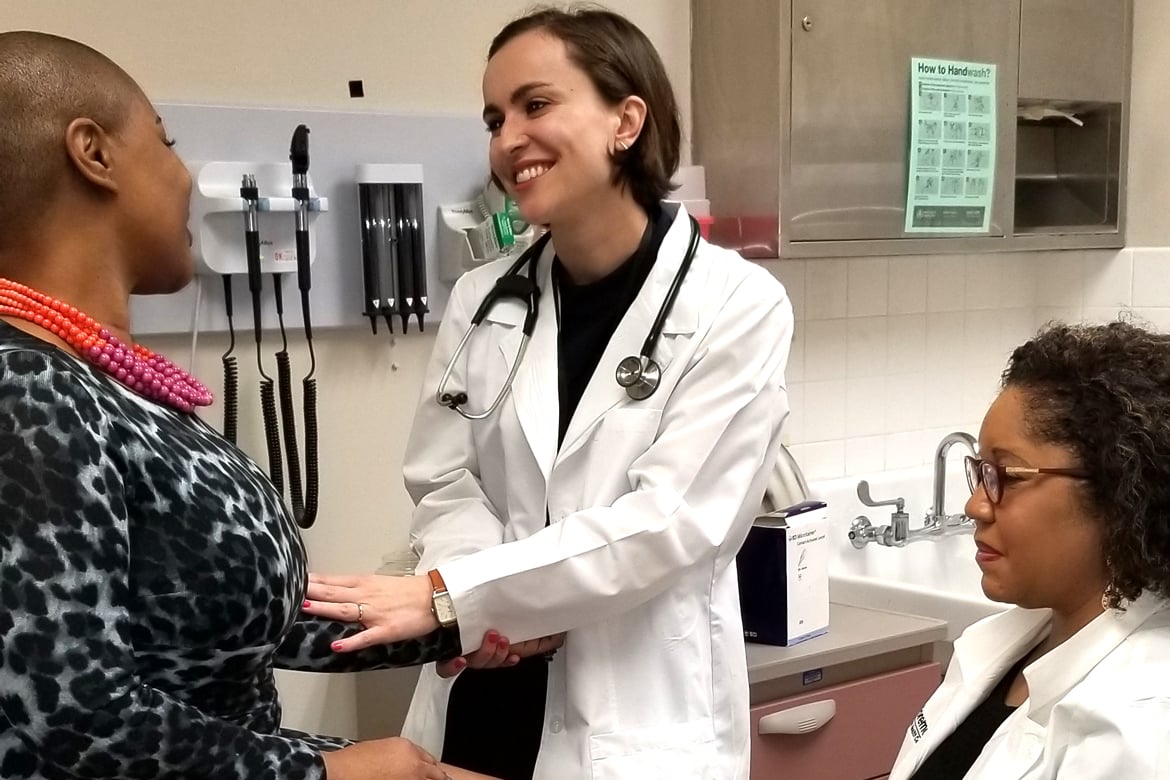Even with an increase in the number of patients with hypertension (46 percent), an emphasis remains on the need for lifestyle change in blood pressure (BP) management rather than solely on pharmaceutical treatments. One Dallas-based medical practice’s biggest change to hypertension management has been related to lifestyle factors such as diet and exercise.
Foremost Family Health Clinic (FFHC), which received Gold Status recognition from the American Heart Association and AMA Target: BP Recognition Program in 2017, provides patients with monthly classes and activities to improve patient care and lower BP. With the aim of giving patients a better understanding of necessary lifestyle changes for hypertension management, classes range from shopping excursions to cooking classes.
“The hypertension guideline strongly emphasizes lifestyle measures like following the DASH diet, and helping people with weight loss and exercise,” family physician and associate medical director, Lindsay Martin-Engel, MD, MPH, said. “We try to encourage that first, and if people need extra peer support or education, we refer them to our Healthy Lifestyle University.”
“It’s really only after the patient has given a full effort on those lifestyle measures that we have to talk about medication,” she added.
FFHC continues to offer different lifestyle activities each month through its health and wellness programs.
“We started with grocery store shopping, talked about colorectal health and then we actually had a fitness class one month,” said the clinic’s other associate medical director, Ashley Meusa, DPM. “We encourage our patients to keep up with their monthly visits, as well as exercise, the DASH diet and low sodium diets—a lot of lifestyle changes.”
Monthly nutrition, cooking classes
Each month FFHC offers different classes to help educate patients on lifestyle change. A recent activity included a cooking class led by a dietician to discuss the use of low sodium in meals.
The monthly healthy lifestyle activities began in August 2017 with a kick-off grocery store shopping trip. It was led by a dietician who walked down the aisles and taught patients how to properly read labels. After completion, patients received a gift card to use for their healthy purchase.
“Many [patients] have talked about how their blood pressure has come down—one even shared how she lost 10 pounds,” Dr. Meusa said. “They’ve definitely been more active and have been reading labels.”
By having additional resources available for lifestyle change, Dr. Martin-Engel feels patients remain happy and receptive because once they have started taking an antihypertensive medication they remain on it for life.
“This is one last chance for them to take measures into their own hands before having to start medication,” she said. “Sometimes we make promises and plans that end up being harder to stick to, but the fact is we have to give people the chance to make the right choices with their lifestyle.”
Commit to quit smoking
Out of their efforts with hypertension management, FFHC now offers weekly smoking cessation classes for patients.
The smoking cessation program is led by the clinic’s behavioral health counselor. In weekly meetings, the counselor speaks with patients about the challenges to behavior change and how anxieties can push them back into an old habit. This peer support group aims to hold patients accountable while giving them the motivation they might not have on their own.
“We’re working together with the patient, putting together resources not just for visiting the clinic, but to also come to our healthy lifestyle classes where we can talk about other things,” said Dr. Meusa. “[It’s about] letting the patient know we’re going to work with you—it’s a team effort.”
The Million Hearts Hypertension Control Challenge is a federal competition to identify clinicians, practices and health systems that have achieved a hypertension control rate of 70 percent or greater among their patients with hypertension and award them with recognition for their work.
Target: BP™ is a national initiative co-led by the American Heart Association and the AMA. In addition to direct access to trained field support specialists, a data platform and a suite of evidenced-based tools and resources offered by the AMA and the AHA, Target: BP offers annual, recurring recognition for all participating sites that achieve hypertension control rates of 70 percent or higher among their adult patient population year over year. Learn about the 300-plus organizations recognized by Target: BP.




